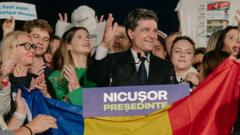Nicusor Dan, the liberal mayor of Bucharest, has secured the Romanian presidency by defeating right-wing nationalist George Simion in a closely contested race that highlights divided public sentiment and the nation's political landscape.
Liberal Mayor Nicusor Dan Triumphs Over Nationalist George Simion in Romanian Presidential Race

Liberal Mayor Nicusor Dan Triumphs Over Nationalist George Simion in Romanian Presidential Race
Pro-European candidate wins 54% of the vote amid political tension, proposing unity and reform.
In a notable victory for liberalism in Romania, Nicusor Dan, the pro-EU mayor of Bucharest, emerged victorious in the presidential election, claiming 54% of the votes against right-wing nationalist George Simion. The victory unfolded as a culmination of months of political unrest, which had seen the previous election annulled due to allegations of Russian interference. Dan's victory is seen as a referendum against nationalism and an affirmation of Romania's commitment to European integration.
Despite a strong showing in the first round, where Simion garnered significant support among the diaspora and criticized the EU, Dan's ability to mobilize domestic and expatriate voters solidified his victory. "We need to build Romania together irrespective of who you voted for," Dan stated following the announcement of his victory, emphasizing unity in a time of deep political divides.
Dan's campaign primarily focused on combatting corruption and continuing Romania's support for neighboring Ukraine, while Simion's platform included strong criticism of the EU and calls for reducing aid to Kyiv. While Dan celebrated his win late into the night alongside ecstatic supporters, Simion initially clung to hope of victory given his stronger performance in the diaspora vote before ultimately conceding defeat early Monday morning.
The electoral outcome is seen as a decisive rejection of Simion's brand of nationalism and isolationism, signaling a broader trend among the Romanian populace who are increasingly disillusioned with mainstream parties. The election results not only portray Dan as an advocate for reform and European values but also hold implications for Romania's future political alignment.
The response from neighboring countries has been overwhelmingly positive, with leaders from Moldova and Ukraine extending congratulations to Dan and emphasizing collaborative futures. Meanwhile, European Commission President Ursula von der Leyen hailed the election as a reflection of the Romanian people's desire for an open, democratic, and prosperous future.
Even though Simion's substantial vote indicates significant support for nationalist ideologies, it also acts as a reminder of the split sentiments within Romania that could shape future political dynamics in the European Union context and beyond. The implications of this election may well influence Romania's trajectory, as the nation grapples with navigating its place within Europe amidst rising populism.






















